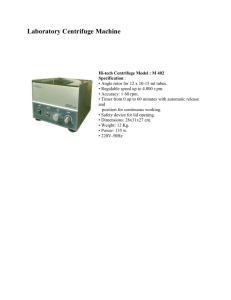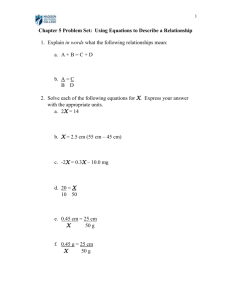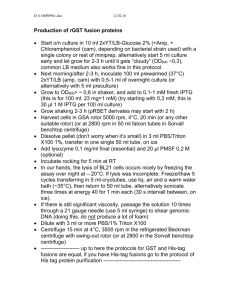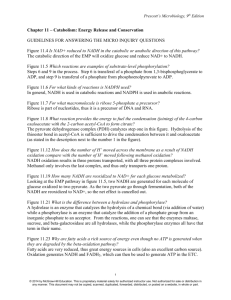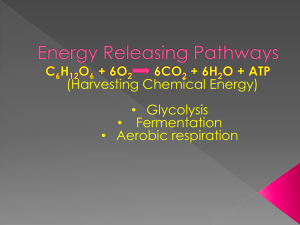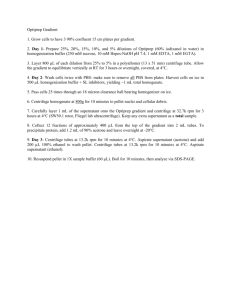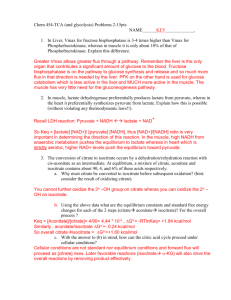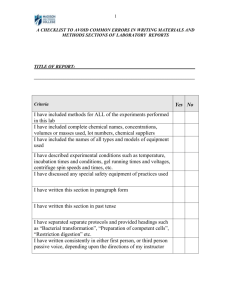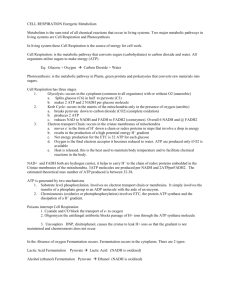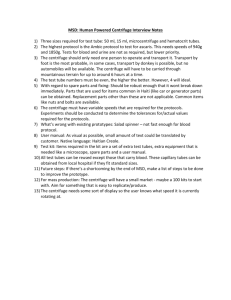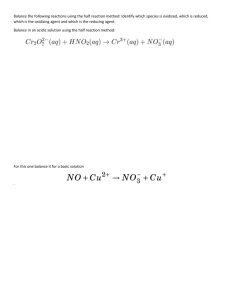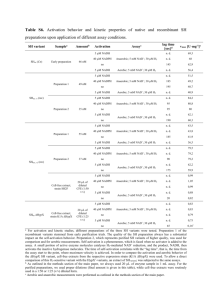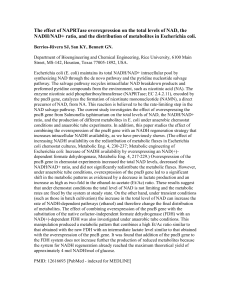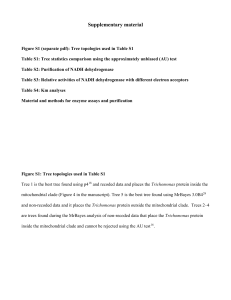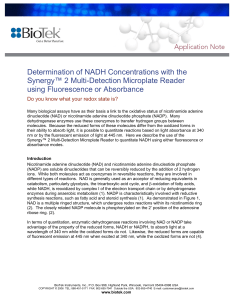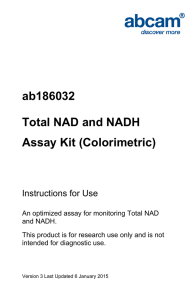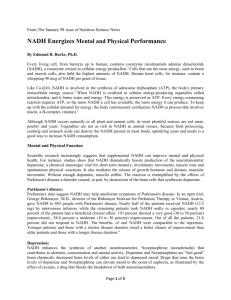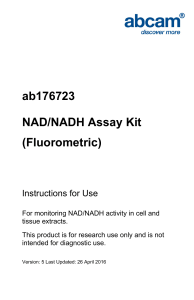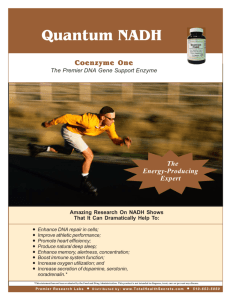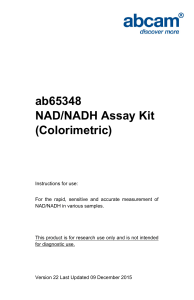Cell Fractionation Summary & Revision Experimental animals Rats
advertisement
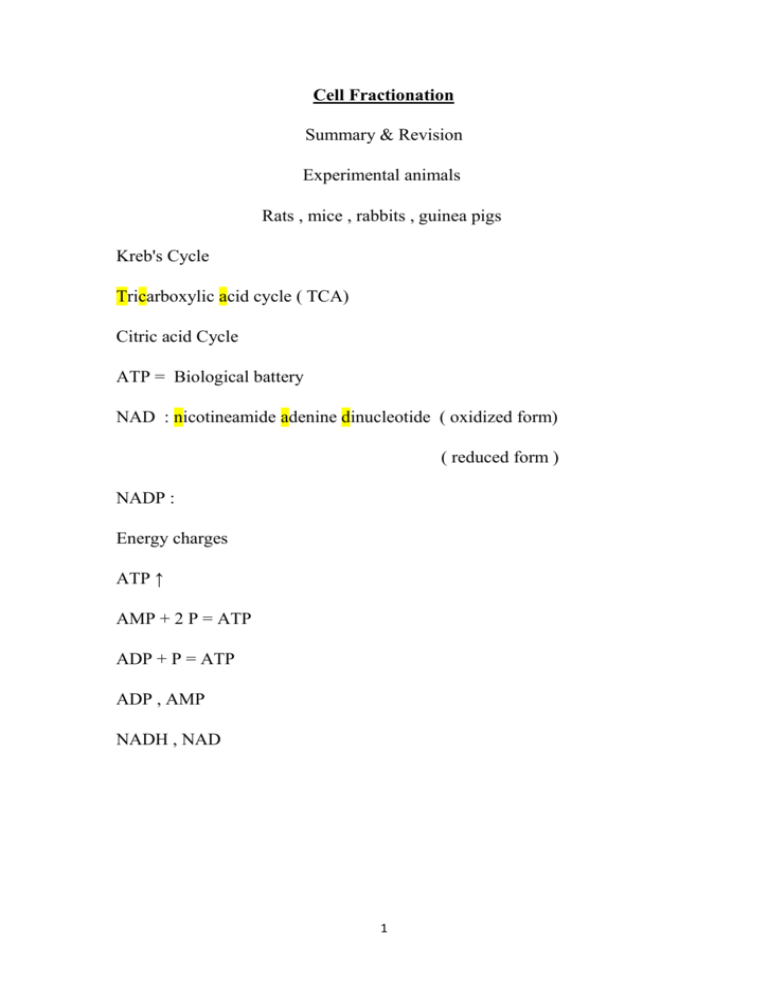
Cell Fractionation Summary & Revision Experimental animals Rats , mice , rabbits , guinea pigs Kreb's Cycle Tricarboxylic acid cycle ( TCA) Citric acid Cycle ATP = Biological battery NAD : nicotineamide adenine dinucleotide ( oxidized form) ( reduced form ) NADP : Energy charges ATP ↑ AMP + 2 P = ATP ADP + P = ATP ADP , AMP NADH , NAD 1 ما المقصود ؟؟ هل يمكن عزل جميع عضيات الخلية في صورة سليمة ؟؟؟ عزل النواة -التحقق من عزل النواة عزل الميتوكوندريا -التحقق عزل الميكروسومات و الاليسوسومات -التحقق عزل السيتوسول – التحقق تقنية الطرد المركزي -األنواع – الخصائص األنزيمات -فكرة عامة -كيفية تقديرها – نشاطية األنزيم الحسابات و النتائج 0.25 M – 0.34 M Sucrose solution M.W = 342 100 ml g = 0.25 * 342 * 100 / 1000 8.5 g / 100 ml For osmotic pressure 2 MCQ : Multiple Choice Questions Sucrose Carbohydrate Disaccharide Table sugar Glucose + Fructose C6 H12 O6 72 + 12 + 96 = 180 Isomers 3 Crude DNA Diphenyl amine R. ( R. = Reagent ) DNA -------- Deoxyribose ----------(HCl) _____ Furfural derivative ( diphenyle amine ) ____________ Bluish color Standard DNA ( Calf thymus ) Crude RNA Orcinol -------- ribose ----------(HCl) _____ Furfural derivative ( orcinol ) ____________ Blue – green color Confirmatory Tests Tm : melting temperature Nitrogenous bases A , C , G , T , U 260 – 280 nm ( U.V. region ) ultra violet U.V. absorption method for Nucleic acids ( for pure samples ) Purification تنقية Nucleoproteins ( conjugated protein) Histones E 1%1Cm for DNA at 260 nm = 200 ( Calf Thymus ) 1g / 100 ml 1000 mg / 100 ml 4 10 mg / 1 ml ____ 200 1mg / 1ml ______ 20 0.1 mg / 1 ml _______ 2.0 0.01 mg / 1 ml ______ 0.20 E 1%1Cm for RNA at 260 nm = 250 ( yeast ) Results : ? mg DNA ( or RNA) / g liver dry tissue Column chromatography أنواع كروماتوجرافيا العمود Gel filtration ( based on mol.wt. ) Ion exchange chromatography ( charge ) Affinity chromatography 5 Kreb's cycle β Oxidation of f.as. Oxidative phosphorylation ETC ( electron transport chain ) IDH isocitrate dehyrogenase Microsomes Ultracentrifuge ( 75,000 r.p.m ) Beckmann Mixed function oxidases ( MFO) eg : aldehyde oxidase , xanthine oxidase , Cyt P450 Cytosol High speed centrifuge ( 15000 – 18,000 rpm ) Sorvall ( American company ) 6 Glycolysis Glucose __________________ pyruvate Pyruvate + NADH _______________ lactate + NAD LDH : lactate dehydrogenase RCF : Relative centrifugal force 45,000 xg = ??? rpm E , S , P , PH , T S : Substrate E : Enzyme T:Temperature In-vitro In-vivo Enzyme assay Amylase Starch ( MW 1.5 * 10 6 ) ________ Dextrins __________ Disaccharides ( maltose & isomaltose ) _____________ Glucose ( reducing sugar ) 7 C6H12O6 ( 72 + 12 + 64 = 180 ) µ mole produced / min / ml E = U / ml U : unit 3,5 DNS 3,5 Dinitrosalicylate , yellow – orange in color ( color R for reducing sugars ) 0504677397 The reducing sugar will reduce NO2 group in position 3 to NH2 The color will be changed from yellow orange into red DNS has two functions To stop the enzymatic reaction ( DNS is prepared in 2M Na OH ) Will react with glucose produced Cytology Eukaryotes Organelles Plasma membrane Nucleus Cytoplasm = cytosol Mitochonderia Ribosomes Endoplasmic reticulum Golgi apparatus Nucleolus 8 Rat liver ( 1 g ) 0.25 M sucrose Homogenization ( Homogenizer ) 1:5 Centrifugation ( Centrifuge ) 1. Bench- Top centrifuge ( up to 6000 rpm ) rpm : round per minute 2. High speed centrifuge ( up to 20000 rpm ) Sorvall : American company 3. Ultra centrifuge ( up to 100000 rpm ) Physiological Saline = 0.9% NaCl 9 Dehydrogenases enzymes e.g . isocitrate dehyrogenase alpha – ketoglutarate dehydrogenase Oxidoreductases E.C.1 Enzyme Commission pyruvate dehydogenase complex Coenzymes NAD , NADP , FAD , NADH , NADPH , FADH 2 A = KCL C = A / KL C = 0.055 * 10 6 µ mol * Cm / 6.22 * 10 3 L * 1Cm C = 0.055 * 10 6 µ mole * Cm / 6.22 * 10 3 103 ml * 1 Cm No. of µmoles produced of NADH / min / vol. added of mitochondrial fraction U/ml U / g wet tissue E 1M1Cm for NADH ( NADPH ) at 340 nm = 6.22 * 10 3 L mol-1 Cm -1 Zero time A = 0.726 1 min. = 0.772 2 min = 0826 3 min = 0.872 4 min = 0.934 5 min = 1.00 10 0.046 0.054 0.046 0.062 0.066 ∆ A / min = 0.055 Some Lysosmal enzymes Proteases ( for protein degradation ) Nucleases ( eg, ribonucleases , deoxyribonucleases ) Lipases ( for lipid degradation ) Galactosidases ( α – galactosidases , β- galactosidases ) Phosphatases ( for phosphate removal ) Lysosomal storage diseases ( LSD ) 11 Cytosol fraction 18,000 rpm ( High speed centrifuge ) Marker : lactate dehydrogense LDH Sod. Pyruvate + NADH + H + → lactate + NAD + CH3 C=O COO- Na + + NADH + H + → CH3 CHOH COO- + NAD + P→L L→P A = KCL C = A / KL C = 0.036 * 10 6 µ mol * Cm / 6.22 * 10 3 L * 1Cm C = 0.036 * 10 6 µ mole * Cm / 6.22 * 10 3 103 ml * 1 Cm No. of µmoles disappeared of NADH / min / vol. added of cytosolic fraction U/ml 1 : 5 ( 1g / 5 ml ) 1ml = 0.2 g U / g wet tissue E 1M1Cm for NADH ( NADPH ) at 340 nm = 6.22 * 10 3 L mol-1 Cm -1 Zero time A = 0.726 1 min. = 0.682 2 min = 0.640 3 min = 0.60 4 min = 0.31 5 min = 0.12 12 0.044 0.042 0.040 0.029 0.019 GOUT ( disorder of uric acid metabolism ) Cofactor 1. Coenzyme 2. Metal ion ( Mg , Zn , Ca …… etc ) 3. Prosthetic group Hydrophilic Hydrophobic GluT2 Hydrology 13 Microsomal & lysosomal fraction Ultra centrifuge ( 75000 rpm ) Marker or indicator Microsomal fraction 1. Glucose -6- phosphatase ( G6Pase ) G6p → Glucose + Phosphate ( Pi ) Phosphate ( Pi ) +Ammonium molybdate → Phosphomolybdate ( Mo+6 ) + Reducing agent ( Vit.C : ascorbic acid ) → ( Mo+3 ) Mo2O3 Molybdenum blue Specificity Mo : molybdenum 2. MFO : Mixed Function Oxidases ( drug metabolism ) Xenobiotics Aldehyde oxidase Xanthine oxidase 14 Lysosomal fraction Indicator : Acid phosphatase ( ACP) P- nitrophenyl phosphate → P-nitrophenol + Pi Yellow in color Λmax = 400 – 405 nm Increase in A Extinction coefficient = 18.7 Prostate cancer ( clinical application ) 15
